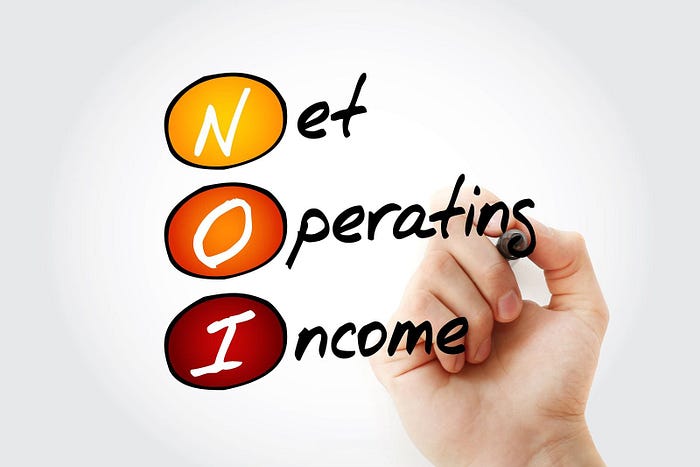
Introduction
In the dynamic realm of real estate, where fortunes are made and decisions hold immense financial consequences, a firm grasp of financial metrics is non-negotiable. Among these metrics, Net Operating Income (NOI) emerges as a fundamental and versatile tool.

Whether you are a seasoned real estate professional or an aspiring investor, this extensive guide aims to equip you with the profound knowledge required to navigate the nuanced world of NOI effectively.
What is NOI in Real Estate?
At its essence, Net Operating Income (NOI) is a bedrock concept in real estate investment analysis. It serves as a robust indicator of a property’s financial performance, representing the income generated after meticulously subtracting all operating expenses.
By providing a comprehensive view of a property’s profitability, NOI plays a pivotal role in shaping decisions for investors, lenders, and real estate professionals.
The Multifaceted Importance of NOI
NOI serves multiple pivotal functions within the realm of real estate:

- Profitability Assessment: For investors, NOI is the litmus test for a property’s profitability. A higher NOI generally signifies a more lucrative investment opportunity, making it a critical starting point for investment analysis.
- Property Valuation: Real estate professionals heavily rely on NOI when determining a property’s fair market value. This valuation is often accomplished by dividing the property’s NOI by the prevailing market capitalization rate, emphasizing the direct link between NOI and property value.
- Investment Comparison: When evaluating multiple investment opportunities, NOI becomes the compass that guides investors toward the most financially sound choice. It allows for an apples-to-apples comparison of properties, enabling informed investment decisions.
- Loan Eligibility: Lenders, too, utilize NOI as a crucial factor in assessing a property’s eligibility for loans and in structuring loan terms. A higher NOI enhances the property’s creditworthiness, potentially leading to favorable financing options.
Calculating NOI
The calculation of Net Operating Income is rooted in a simple yet powerful formula:
NOI = Total Revenue − Operating Expenses

Here, Total Revenue encompasses income from various sources such as rent, parking fees, and other revenue streams. Conversely, Operating Expenses encompass a wide array of costs, including property management, maintenance, property taxes, insurance, and utilities.
Factors Affecting NOI
Understanding the multifaceted nature of NOI requires acknowledging the various factors that can substantially influence a property’s NOI:

- Vacancy Rates: High vacancy rates can lead to reduced rental income, consequently impacting NOI. Strategies to minimize vacancies are essential for optimizing NOI.
- Operating Expenses: Efficient management practices and rigorous cost control can substantially boost NOI figures. Property managers often play a critical role in this aspect.
- Rent Increases: Implementing rent increases, when justified, can directly contribute to a higher NOI, boosting property income.
- Market Trends: Economic conditions and market trends can substantially impact a property’s income and expenses. Keeping abreast of these trends is essential for NOI optimization.
Conclusion
With an extensive grasp of Net Operating Income (NOI) in the realm of real estate, you are now better equipped to make informed investment decisions and navigate the complexities of property analysis. While NOI is a fundamental metric, it is just one piece of the puzzle.

Mastery of this metric, combined with a holistic understanding of market dynamics, property management, and financial analysis, will empower you to excel in the world of real estate investments.
Frequently Asked Questions (FAQs)
What are common operating expenses in real estate?
Operating expenses in real estate encompass a broad spectrum of costs, including property management fees, maintenance expenses (both routine and capital improvements), property taxes, insurance premiums, and utility expenses. Understanding and effectively managing these expenses are critical for accurate NOI calculations.
How does NOI affect property value?
Net Operating Income has a direct and profound influence on a property’s value. Generally, a higher NOI translates to a higher property valuation, making it a pivotal metric for real estate investors and professionals alike. The relationship between NOI and property value underscores the significance of NOI in property assessment.
Can NOI be negative?
Yes, NOI can indeed be negative in certain scenarios. When a property’s operating expenses surpass its total revenue, the result is a negative NOI. This situation indicates that the property is not generating enough income to cover its operating costs, highlighting potential financial challenges that need to be addressed.
Is NOI the same as cash flow?
No, NOI is not synonymous with cash flow. While NOI represents income before accounting for financing costs and taxes, cash flow factors in these crucial financial components. Cash flow provides a more holistic view of a property’s profitability, as it considers the impact of debt service and tax liabilities on the property’s financial performance.
How can I increase the NOI of my real estate property?
Boosting NOI requires a multifaceted approach:
Rent Optimization: Consider raising rent rates when market conditions and tenant agreements allow for it, keeping an eye on local rent control regulations.
Cost Management: Implement efficient property management practices to control operating expenses, including proactive maintenance to minimize repair costs.
Value-Add Strategies: Explore opportunities to enhance property value, such as renovations, improvements, or adding revenue streams like vending machines or laundry facilities.
Tenant Retention: Minimize tenant turnover by offering exceptional service and maintaining strong tenant relationships.
Market Analysis: Continuously monitor market trends and adjust strategies accordingly to maximize income and minimize expenses.
Where can I find reliable NOI data for a property?
Reliable NOI data can be obtained from various sources, including:
Property Management Records: These records often provide a detailed breakdown of income and expenses for a property.
Financial Statements: Property financial statements, including income statements and balance sheets, can offer valuable NOI insights.
Real Estate Professionals and Appraisers: Consulting with experienced real estate professionals, appraisers, and industry experts can provide reliable NOI data and insights specific to your property and market.
If you need help ranking your blog or website with my exclusive writing services, contact us using the link below:



